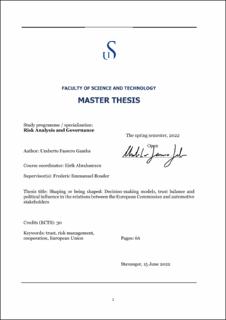| dc.description.abstract | For a long time, Europe has been considered a prominent example of a Consensual decision-making approach (Renn, 2001), where institutions, industry stakeholders, and the elite from the social groups were consensually developing legislation. The system, however, started changing in the 90s, following several scandals that have impacted industry credibility. The call for transparency has made the European institutions more suspicious about industry stakeholders’ trustworthiness and has opened the decision-making process to new players, most notably, NGOs.
The research focuses on the case study of the automotive industry, analysing the elements which characterise the decision-making system at a European Commission’s level and the level of collaboration among stakeholders (both industry players and NGOs).
The present Master Thesis provides an overview of the main perspectives on trust following Poorninga’s (2006) typology and acknowledges the four models of decision-making styles discussed by Renn (2001). By focusing on the case study of the automotive industry in Europe, the research shows that, in contrast with what was first expected, the current level of play is not significantly unbalanced in favour of NGOs, but industry players still play a significant role in advising the European Commission on technical aspects of the legislation.
The current system, which is not as challenged as current literature could suggest, is discussed to be a hybrid model between a Corporativist and a Consensual approach, with stakeholders discussing and collaborating (often basing their trust on strategic evaluations), but also engaging in arguments among themselves and with the European Commission when the proposals do not reflect the policy asks of the lobbies.
The present paper also finds that industry stakeholders’ influence on the Commission’s work widely depends on the legislation under development. The legislative proposals may often be driven by political objectives and based on impact assessments provided by the Commission’s consultants, making stakeholder influence more challenging. In the case of implementing regulations and delegated acts, the need for expertise from the industry and the importance of market intelligence puts stakeholders in a better position, enabling the co-creation of legislations. | |
